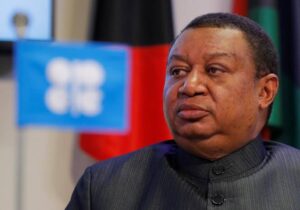 The Secretary-General of the Organization of Petroleum Exporting Countries (OPEC), Mr Mohammed Barkindo, in a chat with Energy Intelligence, on Tuesday, urged its member countries not to flout the oil production cut deal that was agreed upon last April.
The Secretary-General of the Organization of Petroleum Exporting Countries (OPEC), Mr Mohammed Barkindo, in a chat with Energy Intelligence, on Tuesday, urged its member countries not to flout the oil production cut deal that was agreed upon last April.
The deal came into effect after the unfortunate negative oil prices caused by the COVID-19 pandemic. Despite the impressive rise and improvement in global oil prices, he advised the organization’s member countries and its allies (popularly known as OPEC+) not to relent, and stick to reducing production.
African member countries of OPEC (Algeria, Angola, Congo, Equatorial Guinea, Gabon and Nigeria) with the exception of Libya, are believed to have all joined in the global production cut. The Nigerian Minister of State for Petroleum Resources, Mr Timpre Sylva, said that the country would join OPEC+ to cut supply by 9.7 million barrels per day in different cuts from May 2020 to April 2022.
The Minister was quoted saying, “Based on reference production of Nigeria of October 2018 of 1.829 million barrels per day of dry crude oil, Nigeria will now be producing 1.412 million barrels per day, 1.495 million barrels per day and 1.579 million barrels per day respectively for the corresponding periods in the agreement. This is in addition to condensate production of between 360-460 KBOPD of which are exempt from OPEC curtailment.”
Mr Barkindo was positive that with countries gradually easing their restrictions, thereby opening up their economies, and with China’s economy gradually picking up, the oil market wouldn’t take too long to return to normal.
“There are tentative signs of a recovery, we do believe that the worst is behind us. Nevertheless, we also realize that we cannot lose our laser focus on helping bring supply and demand back into balance and providing a more stable market in the coming months. This is not the time to stand back and admire what has been achieved over the past weeks. We will not take our foot off the gas.”
The Secretary-General also noted that the OPEC secretariat was monitoring the global market closely. He expressed confidence in the compliance of the OPEC+ to the agreement. He also stated that all the countries involved were in constant communication with each other to implement and monitor the progress.
“Indeed, some of the demand contraction in 2020 may also be mitigated sooner, if the extraordinary government stimulus packages around the world accelerate a faster economic rebound. There is also widespread recognition that there is no short-term fix. The OPEC+ agreement’s scale and scope underscores the fact that this is also a platform for recovery and future growth.”
He also applauded the decision of Saudi Arabia to further voluntarily cut its production by 1 million barrels per day for the month of June, and the Kingdom calling on other members to do the same. The United Arab Emirates, Kuwait and Oman have also agreed to voluntarily reduce their crude oil production following Saudi’s cut. He said it “underscored the leading role that these countries are playing in helping expedite the rebalancing process.”
He refused to comment on the possible outcome of the next meeting of senior OPEC+ officials scheduled for 10th of June, which would centre on reviewing the new developments in the market.
He noted that if the current downturn of the industry lingered on for a longer period, it might have an adverse effect on global oil supply and prices and reduce investment in the Exploration and Production (upstream) sector of the industry.
“Investments are the lifeblood of the oil industry. A lack of investments today and in the near future could have major implications for both producers and consumers in the medium and longer term.”